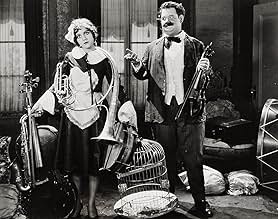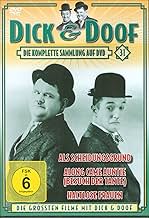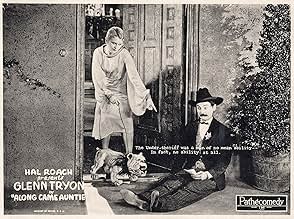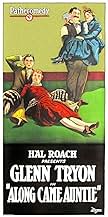First I should explain that despite my subject heading up above this is not a Laurel & Hardy film: Stan Laurel was one of the writers, and Oliver Hardy plays a prominent role, but it would be another year before their on-screen teaming took place. Meanwhile, and despite a promising opening sequence, this comedy is an unfortunate misfire, more like a lesser Sennett effort of the period than what we expect from the Hal Roach Studio. The story concerns a woman (Vivien Oakland) who has divorced and remarried, but pretends she's still married to her first husband (Hardy) in order to collect an inheritance from a puritanical aunt. Obviously the plot is farcical and not meant to be taken seriously, yet even on the level of sheer farce the filmmakers didn't make much of an effort to piece together a semi-plausible story. After a while all pretense of credibility falls apart and the piece turns silly and tedious, topped off with a genuinely coarse closing gag. Ollie has a couple of mildly amusing moments but was certainly given better material elsewhere; Laurel & Hardy would rework this premise as "That's My Wife" in 1929, a much more satisfying two-reeler. Still, "Along Came Auntie" bears a few points of interest for Laurel & Hardy buffs.
At the time this film was made producer Hal Roach was attempting to turn leading man Glenn Tryon into the next Harold Lloyd, but just what Roach saw in him is unclear to me. Based on the Tryon films I've seen the guy was a bland-looking juvenile type who suggested a silent era version of Bob Cummings. His attempt at a drag routine in this film only makes me wish that Laurel had taken his role. Not long after this comedy was finished, Tryon played the lead in "45 Minutes from Hollywood," the first film made on the Roach lot that featured both Stan Laurel and Oliver Hardy, though not in the same scene at the same time. Thereafter Glenn Tryon disappears from the Laurel & Hardy saga as a performer, though he contributed to their great 1933 feature "Sons of the Desert" as a gag writer.
Leading lady Vivien Oakland would be a frequent co-star with Stan & Ollie in later years, perhaps most memorably as the judge's wife in "Scram!" But here she has little to do besides stand by and watch fearfully while the guys fight. And boy, is there a lot of fighting in this movie! It looks like whenever they ran out of inspiration, the script must've indicated: General Mayhem Breaks Out. The fighting gets tiresome after awhile. Hard to believe Stan Laurel was one of the writers, except for one title card that smacks of Laurelesqe wit: "Anything might have happened that night --And it did."
Speaking of fighting, there's one more figure of interest in the cast, actor Tyler Brooke, who plays the Under Sheriff in broad Sennett style. In 1929 Brooke was at the center of a real-life, non-comic battle with his one-time colleague Oliver Hardy that made the newspapers. Apparently a game of billiards between the two men turned unpleasant, leading to harsh words and fisticuffs. Brooke sued Hardy for supposedly breaking his arm with a pool-cue. It just goes to show that, "Along Came Auntie" notwithstanding, violence really isn't so funny. Incidentally, although Brooke went on to play several featured roles for director Ernst Lubitsch and worked steadily in bit parts in Hollywood through the '30s, he didn't work at the Hal Roach lot again until 1942, after Laurel & Hardy had departed.























